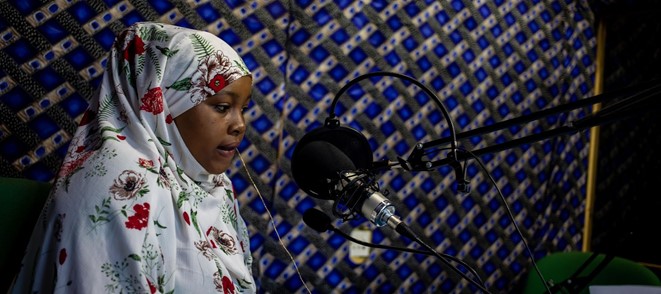Today we celebrate World Radio Day with the theme “Radio and Peace“. To celebrate this year’s World Radio Day, FAO in Somalia is carrying out a project called “Promoting Inclusive Action in Peacebuilding Initiative” (PIAP), which aims to directly respond to the ambitious peacebuilding and sustainable development agenda of the Federal Government of Somalia as outlined in the National Development Plan (NDP) 9 and other strategic and framework policies. This project falls under Strategic Pillar 1 of the NDP: “All Somalis live in a peaceful, inclusive and cohesive society”. In addition, this Project is aligned with the UN Sustainable Development Cooperation Framework 2021-25 for Somalia.
Across both Horizontal and Vertical approaches, the PIAP initiative is working to reinforce inter-communal cooperation over natural resources through radio programmes to disseminate peacebuilding and conflict resolution messages.
The initiative is utilizing the radio platform to engage the broader community on infrastructure sites (irrigation canals) to be selected for rehabilitation. Specifically, to generate awareness about PIAP and promote collaboration, radio programmes will be broadcast through traditional FM and a shared social accountability platform. This platform uses a combination of radio programming and SMS messaging to enable the broader Somali constituency in the target area to engage in the project – allowing for feedback received from citizen calls or SMS messages to be analysed and understood, with the potential to inform programming further.
A participatory approach fosters the engagement of youngster communities in the design and production of all radio products, notably the series of radio programmes and a radio dramas. All the themes were identified during a workshop through a shared decision-making process. Among them, it is worth mentioning some guiding principles such as the cause of conflicts, mutual respect and reconciliation. Messaging related to “Peace, communal cooperation and cohesion” or “Water as a shared natural resource” will be developed with participants to demonstrate how young men and women can contribute to conflict resolution and better management of water resources.
The project targets the Buufow and Shalambod villages, both located in the Marka district and share a history marred by clan conflict. Throughout the decades, clan-based violence and tension have impacted the two villages that lie only 7 kilometres apart in the canal zone of the rich farmland of Lower Shabelle. The lack of social cohesion resulted in numerous cases of revenge killing and a general lack of development, hampering business and social linkages between the two communities. Providing support when emergencies arose has also been burdensome, as the main road linking the two villages had been cut off for the past seven years. Both communities depend mainly on agriculture and livestock for their livelihoods, and recurrent drought and climatic changes have hampered production. On top of that, hostilities between the two villages prevented trade between the two villages, with products from Buufow being taken to Marka or Ceel Jalle instead of Shalambod. Stay tuned

